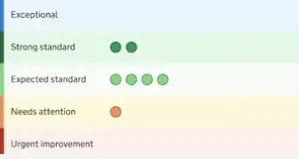By Simon Rocker
Copyright thejc

The Jewish schools’ network, PaJeS, has welcomed Ofsted’s revisions to its new inspection framework which is due to be rolled out laer this term. Following a public consultation, the inspection service has tweaked its “report card” scheme which was originally announced in February. Schools will be assessed in six rather than eight areas as first proposed and with a five-point grading system for each area (rather than four as currently in use). But the grades have been renamed to make them clearer, running from “urgent improvement” to “needs attention”, “expected standard”, “strong standard” and “exceptional”. There will be no overall headline grade for schools. PaJeS said it viewed the new framework with “cautious optimism,” saying: “It has the potential to be highly beneficial for schools, providing clearer insights to all stakeholders about school performance and identifying specific areas for improvement.” It added: “We are especially pleased to see the enhanced focus on SEND provision and parental engagement within the new framework. “This emphasis is particularly significant given recent Jewish Leadership Council research highlighting the crucial role parents play in shaping children’s Jewish identity. “The framework’s recognition that parents have an essential role in their children’s education underlines our perspective of the importance of educational partnerships.” The new scheme will be introduced into volunteer schools in November and then routinely the following month for state schools and in January for independent schools. Schools will be graded for inclusion; curriculum and teaching; achievement; attendance and behaviour; personal development and wellbeing; and leadership and governance. In addition, where appropriate, they will also be assessed on early years and sixth form. Grades will be colour-coded to make it easier for parents to gain an overview of the school. Safeguarding standards will be judged to have been met or unmet, without grading. Jason Elsom, chief executive of the charity Parentkind, said, “We know that strong partnerships between home and school make a huge difference to children’s wellbeing and outcomes. Yet, too often, resource-stretched schools have been unable to prioritise parental engagement when other performance measures have taken precedence.” He added: “For the first time, parental engagement is given clear priority: no school will be able to achieve top marks unless it demonstrates that it has got this right.”



